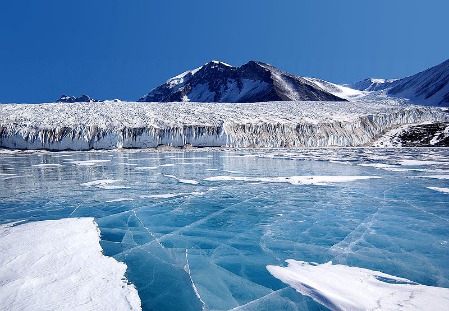
The blue ice covering the lake comes from glacial meltwater from the Canada Glacier and other smaller glaciers. The fresh water stays on top of the lake and freezes, sealing in briny water below.
It seems a shame, an entire continent rugged and rich in its own way, wasted, at least for exploitation by modern day humans. But that unique environment has enormous potential for science, and it could be an ideal place for astronomy and space exploration research that might reach far beyond the icy plains and frozen mountains:
(Space.com) — “There’s a whole range of things you can do in astronomy at Antarctica that you can’t do anywhere else on Earth,” Burton said. “To beat Antarctica, you’d have to go to space. The good thing about Antarctica compared to space is that once you get something in space, you can’t expect to change it, while in Antarctica, you can always build it bigger.”
It is dry and cold, like Mars, there are ancient lakes frozen hundreds or thousands of meters below the surface, similar to what scientists believe exist below Europa’s icy crust. A place of extremes right next door where prototype mobile science labs could perfect trundling and drilling autonomously. A related use for the frozen wilderness, at least in my view, is research and dry runs for space colonization. It’s an ideal place to work out community dynamics and test equipment in a hostile, yet forgiving terrain, compared to what awaits us in the solar system.
Developing and refining technologies that recycle and conserve resources, with an eye toward one day keeping a quasi-self sustaining community of a dozen occupants alive and healthy — and sane — would be a piece of cake in Antarctica compared to doing it in low earth orbit. The logistics grow exponentially more challenging for the moon and beyond. We have in the frozen south a living lab which, if properly utilized, could lead to a brighter future for more temperate climes the world over.
Think of what we could learn, growing food indoors, reliably and consistently, the treasure trove of fossils that could rewrite natural history, a land ready to give up long-held valuable lodes of materials and knowledge, the latter shedding light on the greatest environmental issues of our time. In fact, given our current technology and the untapped wilderness, would it make sense at some point to think about a beta test, i.e., settling Antarctica in some fashion, beyond the handful of research outposts that currently exist?

On the other hand, think about the potential contamination of fragile ecosystems that would result from us “beta-testing” ways to operate on other planets there. Might be worth it, but it isn’t as clear cut as you suggest here.
drlake | December 11, 2011 at 8:00 am :
On the gripping hand, while any antarctic expeditions should make every reasonable effort to minimize their impact, it now seems likely we won’t replace the coal industry in time to prevent the melting of the West Antarctic Ice Sheet – an event whose impact on Antarctic ecosystems, including those in East Antarctica, will most likely dwarf the impact space exploration trials would have.